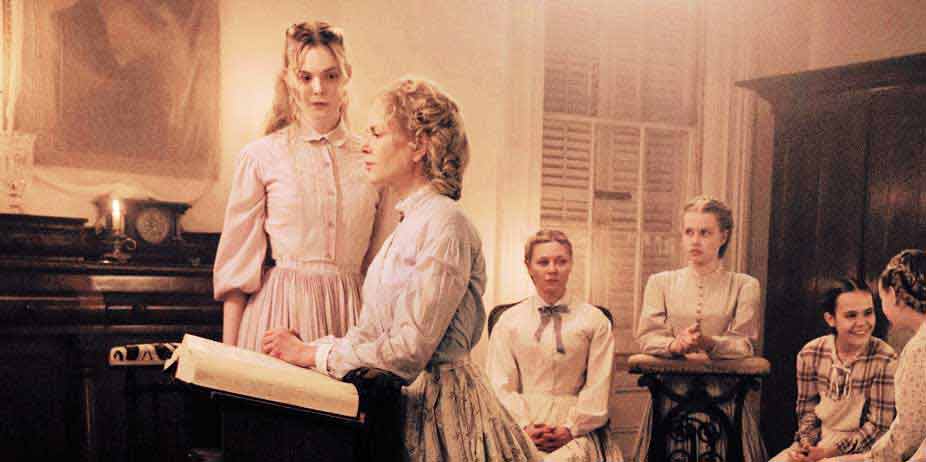 The
Beguiled (2017)
The
Beguiled (2017)
Three years into the American
Civil War, young Marie (Adison Riecke) stumbles across
an injured Yankee soldier deep in the woods of Virginia,
as she picks mushrooms to garnish the table of a local
finishing school. Rather than let Corporal McBurney
(Colin Farrell) bleed out, she helps him to the school,
where Miss Martha (Nichole Kidman) stitches him up,
gives him a sponge bath, and agrees to let him stay
until he is “strong enough” for the Confederate Army to
take away.
The practice for a found
Yankee soldier, dead or alive, is to hang a blue cloth
on the front fence. But she doesn’t. And strangely, when
the retreating Confederate Army pauses to ask after
their welfare, she says nothing then, either. Sensing
his life depends on the girls’ affections for him,
McBurney sets to work beguiling them all, from the
insecure and emotional Edwina (Kirsten Dunst) to the
bold, sexually curious Alicia (Elle Fanning). He even
flatters the four younger girls a bit, and soon finds
ways to be “helpful” around the school, such as tending
the neglected garden.
But wounds cannot last
forever, and what happens the night before McBurney is
supposed to leave changes everyone’s lives forever, and
brings out the darker truths about each person present…
I skim-read the book that inspired this adaptation, and found it lacking; the story moves better in an hour and a half format, although the director’s choice to use a score only at rare intervals is an interesting choice. Though the film was buried under accusations of “whitewashing” (the original book, and earlier adaptation, had a crucial female slave character, but Coppola chose to leave her out and focus only on the students instead), it’s actually an interesting period piece, awash in subtle tension, hidden motivations, and sexual politics. One could see it as an analogy of the darker nature of femininity, of the struggle between falsities and trust, or choose a side, that of the hapless but manipulative McBurney, or the sirens who lure him into the school and keep him there, in an unexpected way. Are they malevolent, are his accusations genuine, or is he delusional and so justifies their decision? The film offers us no answer, and does not attempt to sway us in one direction or another.
For a period piece, it’s atmospheric, and dripping with beauty much the same as the old Spanish-style plantation drips with moss. It moves slow in places, and I do wish it had a powerful musical score to go along with it, but the acting, the tension, the gradual sense of dread, and the sinister conclusion more than held my attention; it has haunted me in unusual ways since. The only thing out of place is the sex scene, which doesn’t seem to match the rest of the muted emotions and actions. The acting is lovely, but Elle Fanning held my focus the most: her raw, unapologetic femme fatale in the making both amuses and sends a chill up my spine.
Sexual Content:
A woman gives a man a sponge bath and is nervous /
exited while doing it (she stops several times and
breathes heavily); a woman barges into a girl's room and
finds her kissing a man on a bed; a man tears a woman's
bodice open (no nudity) and they have clothed sex (the
scene is rather long / graphic). A girl intimates a man
tried to rape her (she lied).
Language:
Several abuses of Jesus' name; a man calls a group of
women 'vengeful b*tches."
Violence:
A woman stitches up a gruesome wound; we see a raw bone
sticking out of a broken leg, where the wound has split;
a man and woman struggle, and she throws him down the
stairs; a man threatens a girl with a gun, and puts a
gun to another woman's head; someone dies from eating
poisoned mushrooms (they stop breathing / suffocate).
Other:
Murder.
